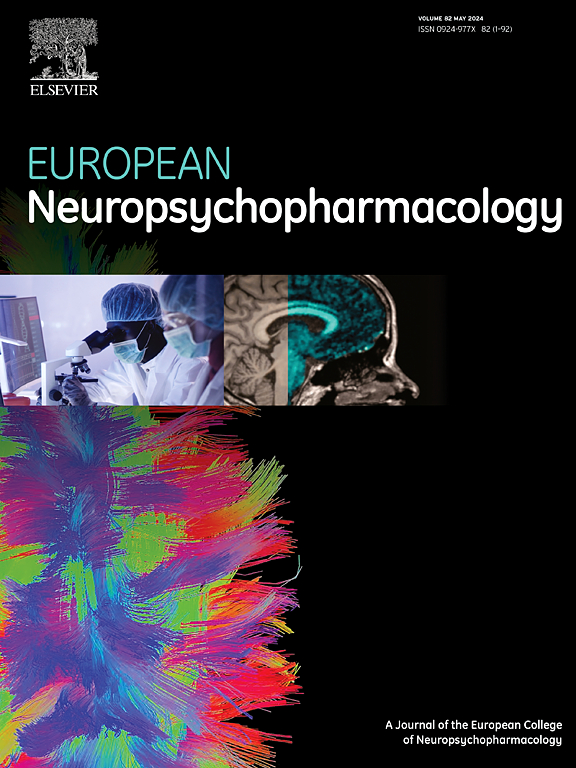检查共病性创伤后应激障碍对氯胺酮在治疗难治性抑郁症中的实际有效性的影响。
IF 6.1
2区 医学
Q1 CLINICAL NEUROLOGY
引用次数: 0
摘要
抑郁症合并创伤后应激障碍(PTSD)与更严重的症状和对传统治疗的反应降低有关。尽管氯胺酮有望作为治疗难治性抑郁症(TRD)的速效抗抑郁药,但其对合并PTSD患者的有效性仍有待进一步研究。因此,我们对来自加拿大卓越快速治疗中心的134例患者进行了回顾性分析,比较四种氯胺酮输注(0.5-0.75 mg/kg)在减轻合并和不合并PTSD的TRD患者抑郁和PTSD症状方面的效果。采用重复测量线性混合模型评估共病PTSD对氯胺酮抗抑郁效果的影响,采用抑郁症状自我报告快速量表(QIDS-SR16)测量。配对样本t检验用于评估PTSD症状的变化,由DSM-5的PTSD检查表(PCL-5)测量。我们发现时间对QIDS-SR16评分有显著的主影响,F(4,209.32) = 36.67, p < 0.001,但各组间无显著的时间交互作用(p = 0.895),提示共病性PTSD不影响氯胺酮的抗抑郁效果。在总体PCL-5评分中观察到创伤后应激障碍症状的显著改善,t(66) = 6.66, p < 0.001,并且在所有PCL-5症状群中具有中等到较大的效应量。在真实世界的TRD患者样本中,氯胺酮可以有效地减轻抑郁和PTSD的症状,而不考虑PTSD的合并症。这些发现突出了氯胺酮作为一种新的干预措施的潜力,用于对常规治疗经常无反应的患者群体。未来的随机对照试验应探索改善和长期影响的中介因素。本文章由计算机程序翻译,如有差异,请以英文原文为准。
Examining the impact of comorbid posttraumatic stress disorder on ketamine's real-world effectiveness in treatment-resistant depression
Depression with comorbid posttraumatic stress disorder (PTSD) is associated with more severe symptoms and a reduced response to traditional treatments. Although ketamine shows promise as a rapid-acting antidepressant for treatment-resistant depression (TRD), its effectiveness in patients with comorbid PTSD remains underexplored. Therefore, we conducted a retrospective analysis of 134 patients from the Canadian Rapid Treatment Center of Excellence to compare the effectiveness of four ketamine infusions (0.5–0.75 mg/kg) in reducing symptoms of depression and PTSD in TRD patients with and without comorbid PTSD.
A repeated-measures linear mixed model was used to evaluate the impact of comorbid PTSD on ketamine's antidepressant effectiveness, measured by the Quick Inventory of Depressive Symptomatology Self-Report (QIDS-SR16). Paired samples t-tests were used to assess changes in PTSD symptoms, measured by the PTSD Checklist for DSM-5 (PCL-5). We found a significant main effect of time on QIDS-SR16 scores, F(4, 209.32) = 36.67, p < 0.001, but no significant group-by-time interaction (p = 0.895), suggesting that comorbid PTSD did not impact the antidepressant effectiveness of ketamine. Significant improvements in PTSD symptoms were observed in overall PCL-5 scores, t(66) = 6.66, p < 0.001, and across all PCL-5 symptom clusters with moderate to large effect sizes.
In a real-world sample of TRD patients, ketamine was effective in reducing symptoms of depression and PTSD, regardless of PTSD comorbidity. These findings highlight ketamine's potential as a novel intervention for a patient population that is frequently non-responders to conventional treatments. Future randomized controlled trials should explore mediating factors of improvement and long-term effects.
求助全文
通过发布文献求助,成功后即可免费获取论文全文。
去求助
来源期刊

European Neuropsychopharmacology
医学-精神病学
CiteScore
10.30
自引率
5.40%
发文量
730
审稿时长
41 days
期刊介绍:
European Neuropsychopharmacology is the official publication of the European College of Neuropsychopharmacology (ECNP). In accordance with the mission of the College, the journal focuses on clinical and basic science contributions that advance our understanding of brain function and human behaviour and enable translation into improved treatments and enhanced public health impact in psychiatry. Recent years have been characterized by exciting advances in basic knowledge and available experimental techniques in neuroscience and genomics. However, clinical translation of these findings has not been as rapid. The journal aims to narrow this gap by promoting findings that are expected to have a major impact on both our understanding of the biological bases of mental disorders and the development and improvement of treatments, ideally paving the way for prevention and recovery.
 求助内容:
求助内容: 应助结果提醒方式:
应助结果提醒方式:


